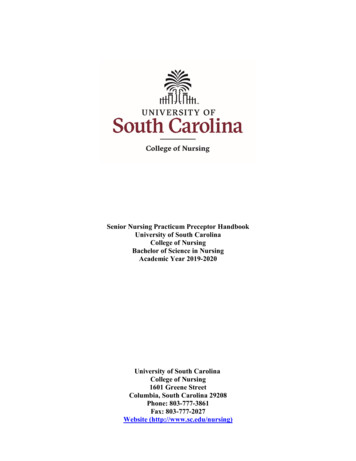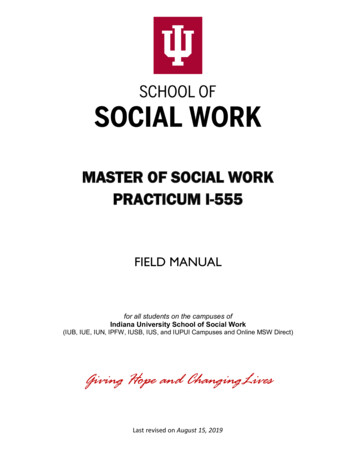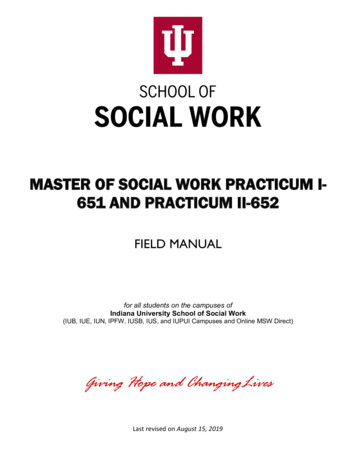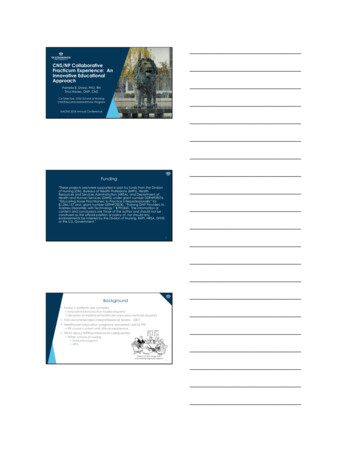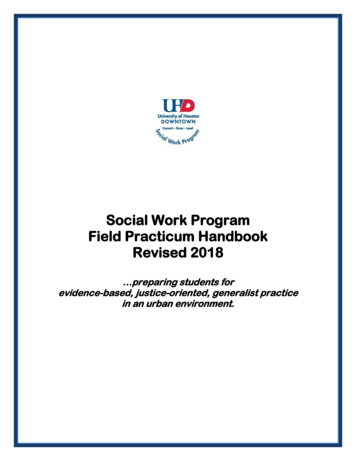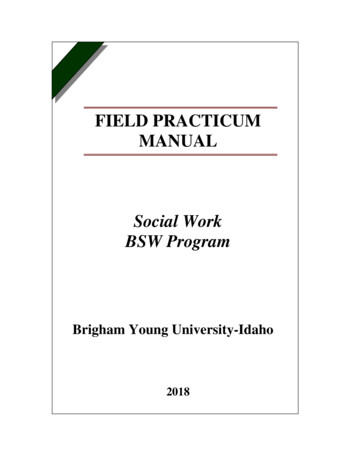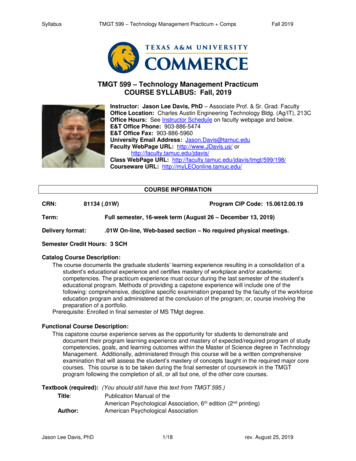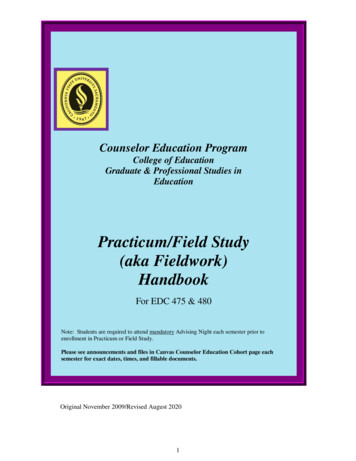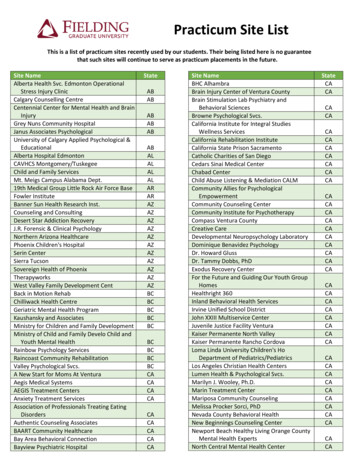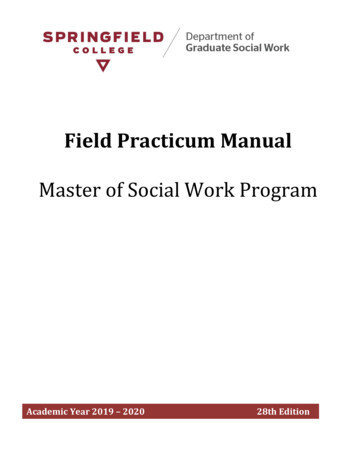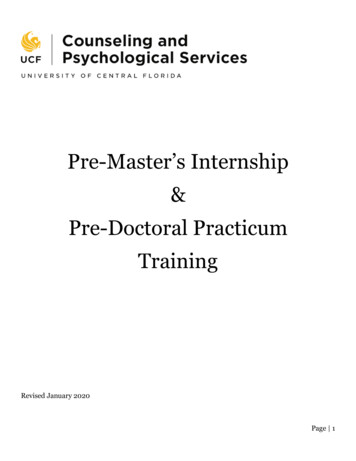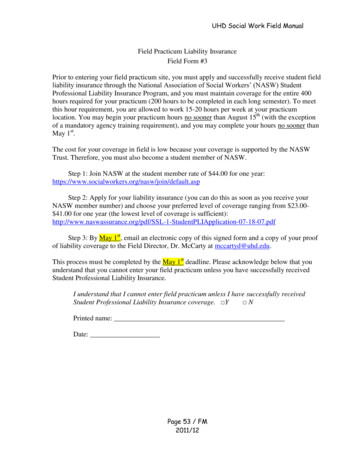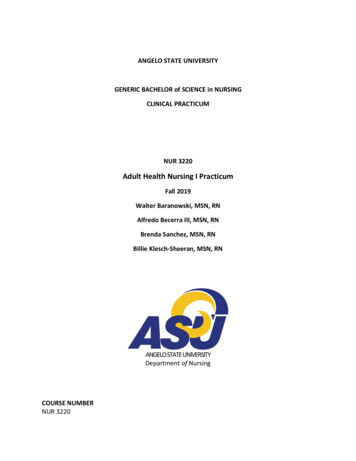
Transcription
ANGELO STATE UNIVERSITYGENERIC BACHELOR of SCIENCE in NURSINGCLINICAL PRACTICUMNUR 3220Adult Health Nursing I PracticumFall 2019Walter Baranowski, MSN, RNAlfredo Becerra III, MSN, RNBrenda Sanchez, MSN, RNBillie Klesch-Sheeran, MSN, RNANGELO STATE UNIVERSITYDepartment of NursingCOURSE NUMBERNUR 3220
COURSE TITLEAdult Health Nursing I PracticumCREDITS(0-0-6)PREREQUISITE COURSESNursing 3304 Health Assessment, Nursing 3305 Clinical Nursing SkillsCO-REQUISITESNUR 3410 Adult Health Nursing IPRE-REQUISITE SKILLSAccessing internet web sites, use of ASU Library resources, and proficiency with Microsoft Wordand/or PowerPoint are an expectation of the Generic BSN program. Computer accessrequirements are further delineated in the Undergraduate Handbook. Tutorials for ASU Libraryand for Blackboard are available through RamPort. The ASU Nursing Program UndergraduateStudent Handbook should be reviewed before taking thiscourse. http://www.angelo.edu/dept/nursing/handbook/COURSE DELIVERYThis is a clinical practicum nursing course that involves direct delivery of patient care services.BROWSER COMPATIBILITY CHECKIt is the student’s responsibility to ensure that the browser used to access course material onhis/her computer is compatible with ASU’s Blackboard Learning System. The faculty reservesthe right to deny additional access to course assignments lost due to compatibility issues.Students are responsible for reviewing the guidelines posted in this course regarding accessingBlackboard assignments. Problems in this area need to be discussed with faculty at the time ofoccurrence, either via a phone call (preferred) during posted acceptable hours for calling, or viaemail notification during times outside those posted for calls.Be sure to perform a browser test. Select the “Support” tab from the Blackboard homepage(http://www.blackboard.angelo.edu) Select “Test your Browser” option.Please see computer requirements for BSN classes at this link:http://www.angelo.edu/dept/nursing/student resources/computer requirements.php
FACULTYWalter Baranowski, MSN, RNAssistant Clinical ProfessorOffice: ACHHS 318 QPhone: (325) 486-6863Fax: (325) 942-2236walter.baranowski@angelo.eduOFFICE HOURSWednesday 0900 - 13000*Alternate times available by appointmentAlfredo Becerra III, MSN, RNClinical InstructorOffice: AHHS 318 VPhone: (325) 486-6855Fax: (325) 942-2236abecerra1@angelo.eduTuesday 1200 - 1500Wednesday 1300 - 1500Brenda Sanchez MSN, RNClinical InstructorOffice: ACHHS 318 UPhone: (325) 486- 6861Fax: (325) 942-2236bmedrano@angelo.eduMonday/Wednesday 1100-1400Billie Klesch-Sheeran, MSN, RNClinical InstructorOffice: ACHHS 318 A3Phone: (325) 486- 6854Fax: (325) 942-2236Billie.Klesch-Sheeran@angelo.edu*Alternate times available by appointmentThursday 120 - 1730Virtual Office Hours*Alternate times available by appointmentCOURSE DESCRIPTIONStudents provide research-based, safe, and appropriate care to culturally diverse adult patients withcommon medical, surgical, or psychiatric conditions. Students use standards of care,informatics/technology, interdisciplinary communication, and error prevention techniques in a variety ofsettings. Grading will be pass or fail.COURSE OVERVIEWThe purpose of this clinical nursing course is to involve students in the direct delivery of patient careservices to adult clients and their families.BSN PROGRAM OUTCOMESUpon completion of the program of study for the Generic BSN, the graduate will be preparedto:1. Integrate nursing and related theories into the planning and/or delivery of safe nursing care.
2. Engage leadership concepts, skills and decision-making in the planning and/orimplementation of patient safety and quality improvement initiatives.3. Identify and appraise best research evidence to improve and promote quality patientoutcomes.4. Utilize technology to access information, evaluate patient data and/or document care.5. Participate in political/legislative processes to influence healthcare policy.6. Engage in effective collaboration and communication within interdisciplinary teams.7. Design and/or implement health promotion & disease prevention strategies for culturallycompetent care.8. Demonstrate standards of professional, ethical, and legal conduct.9. Practice and/or coordinate, at the level of the baccalaureate prepared nurse, to plan and/orimplement patient centered care.STUDENT LEARNING OUTCOMESStudent Learning OutcomeBy completing all course requirements, studentswill be able to:1. Use health data, evidence, clinicaljudgment, and patient preferences inplanning, implementing, andevaluating outcomes of care.2. Implement timely, research-basedinterventions for adult patients withcommon medical, surgical, and/orpsychiatric conditions that addressprinciples of safety and quality.3. Deliver compassionate;appropriate; culturally, ethnically andpatient-centered care based onevidence, guidelines, standards, andlegal statutes/regulations.4. Provide and document effectivehealth teaching to 1-2 adult patientsaddressing risk reduction, healthpromotion, preventative care anddischarge planning.5. Explain how to demonstrateadvocacy for patients and families byprotecting confidentiality, dignity,safety, autonomy, and rights.Mapping toBSN ProgramOutcomesMapping toBSNEssentialsMappingto QSEN1, 4, 9I, III, IV, VIPCC, EBP,I1, 3, 4, 5, 71, 2, 3, 4,9I, II, III, IV,IXEBP, QI, S1, 2, 3, 4, 5, 61, 7, 8, 9I, VII, VIII,IXPCC, TC, S1, 3, 4, 71, 2, 4, 6,9I, II, IV, VI,IXPCC, EBP,TC, S1, 3, 4, 6, 72, 3, 7, 9II, III, VII, IX PCC, EBP,S, IAssignment(s) or activity(ies)validating outcome achievement:1, 3, 4, 6
6. Effectively communicate withpatients, peers, colleagues and healthteam members to facilitate positivepatient outcomes and a professionalclinical environment.7. Demonstrate moral, ethical,professional and legal conduct inadult health clinical settings.1, 2, 3, 4, 5, 6, 72, 6, 8, 9II, VI, VIII,IXPCC,TC, S1, 3, 4, 5, 6, 71, 2, 8, 9I, II, VIII, IX PCC, TC, SREQUIRED TEXTS AND MATERIALS Textbooks - See requirements in Appendix A.Materials – Bandage scissors, watch with a second hand, stethoscope, penlight, ASU uniform(see student handbook), name tags, appropriate reference materials, and appropriate clinicalforms.OTHER REQUIRED MATERIALS Computer with MAC or Windows Operating System High Speed Internet Access We recommend the use of a PDA for referencing data on medications andpathophysiology only.RECOMMENDED TEXTSSee Appendix ATOPIC OUTLINEN/AGRADING SYSTEMCourse grades will be dependent upon completing course requirements and meeting thestudent learning outcomes.The following grading scale is in use for this course:P (Pass), F (Fail), NC* (No Credit), W (Withdrawn)*Note: NUR 3410 & NUR 3320 must be successfully completed simultaneously to receive creditin either course and progress through the program.
EVALUATION AND GRADESRequired assignments, activities comprising the overall course grade:Assignment Activity1. Weekly Clinical Experience Forms2. Dosage Calculation Exam3. Perioperative Experience Paper4. Mental Health Clinical Rotation Assignment5. Student Clinical Evaluations6. High Fidelity Simulation LabCourse ObjectiveCO# 1, 2, 3, 5CO# 1, 2, 3CO# 1, 2, 3, 4, 5, 6, 7CO# 1, 2, 3, 4, 6, 7CO# 1, 2, 3, 4, 5, 6, 7CO# 1, 2, 3, 4, 5, 6, 7TEACHING STRATEGIES Clinical participation and interactionsPre & Post conference activitiesWritten assignments SimulationStudents are expected to be “active learners.” It is a basic assumption of the instructor thatstudents will be involved (beyond the materials and lectures presented in the course)discovering, processing, and applying the course information using peer-review journalarticles, researching additional information and examples on the Internet, and discussingcourse material and clinical experiences with their peers.ASSIGNMENT/ACTIVITY DESCRIPTIONS*Please note: Rubrics for all assignments and activities are located at the end of this syllabus. All workis intended to be the result of individual student effort and work sharing or collaboration is notpermitted on any assignments for this course.Weekly Clinical Experience:The purpose of this clinical nursing course is to involve students in the direct delivery of patient careservices to adult clients and their families. During the clinical preparation period, the student goes to ahealth care facility on the day or night before the actual clinical rotation, and gathers information fromthe client’s chart to complete the assigned sheets (per instructor’s instruction). See Appendix B.Dosage Calculation Testing:The Pre-Clinical Nursing Dosage Calculation Testing Policy exists to facilitate dosage calculationcompetence necessary for safe nursing practice. Students must score 100% on a level-specific dosagecalculation test at the beginning of their clinical practicum each semester. See Appendix C and D.Perioperative Case Study Instructions:The purpose of this assignment is to promote critical reasoning and assess your understanding ofdifferent individual patients’ biopsychosocial needs related to single or multiple pathologies that requiresurgical intervention. See Appendix E. This paper is submitted via blackboard and the instructor willgrade the paper by the rubric on blackboard. The rubric includes any feedback to the author.
Mental Health Clinical Rotation Assignment:Following the mental health rotation, students will utilize informatics and library databases to completethe Psychopharmacology. During the clinical rotation, students will complete the Patient History andPathophysiology and the Therapeutic Interaction Process Recording worksheet for their assigned patientutilizing informatics and library databases. APA formatting of sources cited and reference page required.See Appendix F. This paper is submitted via blackboard and the instructor will grade the paper by therubric on blackboard. The rubric includes any feedback to the author.Student Clinical Evaluations:The student is responsible for completing the AH I Clinical Evaluations at 5, 10 and 15 weeks. Oncecompleted, a copy must be given to the instructor, via fax, electronically, or hand delivery. See moredetails regarding “Evaluation Tools” in Appendix G.High Fidelity Simulation Lab:Students will engage in 3 simulation activities designed to evaluate students’ clinical reasoning,teamwork, communication and clinical skill performance.GENERAL POLICIES RELATED TO THIS COURSEAll students are required to follow the policies and procedures presented in the followingdocuments: Angelo State University Student Handbook located on the ASUwebsite nt Handbook ASU Undergraduate Catalog located on the ASU websitehttp://www.angelo.edu/catalogs/ ASU Nursing Program Undergraduate Student Handbook, located on the Nursingwebsite ANT UNIVERSITY DATESAugust 26First class day of Fall semesterSeptember 2HolidayOctober 31Last day to drop a class or withdraw from the University for thisSemesterNovember 27 – 29Thanksgiving HolidayDecember 2Last Week of Clinical PracticumsDecember 9 - 13Final Exams WeekDecember 13Last Class Day of Fall 2019 SemesterDecember 14Commencement
STUDENT RESPONSIBILITY & ATTENDANCE Come to clinical prepared to apply the theory, concepts, and skills involving specialized materials,equipment, procedures, regulations, laws, and interactions within and among political, economic,environmental, social, and legal systems associated with the particular occupation and thebusiness/industry. Demonstrate legal and ethical behavior, safety practices, communication, interpersonal andteamwork skills Participate in clinical opportunities, simulation, pre & post conference discussions and Blackboarddiscussions (if assigned). Ask questions as needed.*The teaching team reserves the right to make additional or alternative assignments in order to meet theneeds of an individual student or a particular class.Attendance: A week’s worth of cumulative absences in any one course will result in facultyevaluation of the student’s ability to meet clinical objectives and may result in failure of thecourse. This means that if you have one clinical day a week, missing ONE clinical practicumplaces you in jeopardy of course failure.COMMUNICATIONFaculty will respond to email and/or telephone messages within 24 hours during working hoursMonday through Friday. Weekend messages may not be returned until Monday.Written communication via email: All private communication will be done exclusively throughyour ASU email address. Check frequently for announcements and policy changes.In the event of extenuating circumstances preventing a student from attending a clinicalexperience, the student will: Notify the agency before scheduled time to report on duty. Notify the clinical instructor a minimum of one hour before scheduled time to report onduty.Failure to call in will result in an UNSATISFACTORY for that clinical day. Students missing morethan one week of clinical will result in reevaluation of a student’s ability to meet courseobjectives and may result in an unsatisfactory clinical grade. The instructor may assign thestudent work to supplement the experience.Use Good "Netiquette": Check the discussion frequently and respond appropriately and on subject. Focus on one subject per message and use pertinent subject titles. Capitalize words only to highlight a point or for titles. Otherwise, capitalizing is generallyviewed as SHOUTING! Be professional and careful with your online interaction. Proper address for faculty is byformal title such as Dr. or Ms./Mr. Jones unless invited by faculty to use a less formal approach. Cite all quotes, references, and sources.
When posting a long message, it is generally considered courteous to warn readers at thebeginning of the message that it is a lengthy post. It is extremely rude to forward someone else's messages without their permission. It is fine to use humor, but use it carefully. The absence of face-to-face cues can cause humorto be misinterpreted as criticism or flaming (angry, antagonistic criticism). Feel free touse emoticons such as JK or :) to let others know you are being humorous.(The "netiquette" guidelines were adapted from Arlene H. Rinald's article, The Net UserGuidelines and Netiquette, Florida Atlantic University, 1994, available from Netcom.)ASSIGNMENT SUBMISSIONIn this class, some assignments may need to be submitted through the Assignments link in theBlackboard course site. This is for grading purposes. Issues with technology use arise from timeto time. If a technology issue does occur regarding an assignment submission, email yourclinical instructor or me at walter.baranowski@angelo.edu and attach a copy of what you aretrying to submit. This lets your faculty know you completed the assignment on time and are justhaving problems with the online submission feature in Blackboard. Once the problem isresolved, submit your assignment through the appropriate link. This process will document theproblem and establish a timeline. Be sure to keep a backup of all work.LATE WORK OR MISSED ASSIGNMENTS POLICYDue dates and times for assignments are posted within each assignment appendix. Failure tosubmit an assignment by the deadline will result in point deductions, a specified in theassignment rubrics, per day past the posted deadline. Late assignments are not acceptedwithout prior approval of faculty. Assignments submitted past the deadline will result in adocumented counseling, unsatisfactory, and a revised deadline. If revisions to the lateassignment are deemed necessary, a new submission deadline will be assigned and anautomatic 15 point deduction will be taken (i.e. all revised assignments will start at an 85% asthe maximum grade). Failure to submit the revised assignment by the deadline will result inanother documented counseling and unsatisfactory. Further revisions are at the discretion ofthe instructor.ACADEMIC INTEGRITYAcademic honesty is expected on all work. Students are expected to maintain complete honestyand integrity in their online experiences. Any student found guilty of any form of dishonesty inacademic work is subject to disciplinary action and possible expulsion from ASU. All codes andpolicies are set forth in the University Student Handbook of Angelo StateUniversity http://www.angelo.edu/student-handbook/ as well as the Department of NursingUndergraduate StudentHandbook html.The Nursing Department adheres to the academic honesty statement as set forth in the AngeloState University Student Handbook, which states "Students must understand the principles ofacademic integrity, and abide by them in all class and/or course work at the University.
Academic Misconduct violations are outlined Part I, section B.2 of the Code of Student Conduct.If there are questions of interpretation of academic integrity policies or about what mightconstitute an academic integrity violation, students are responsible for seeking guidance fromthe faculty member teaching the course in question."PLAGIARISMPlagiarism at ASU is a serious topic. The Angelo State University’s Honor Code gives specificdetails on plagiarism and what it encompasses. Plagiarism is the action or practice of takingsomeone else's work, idea, etc., and passing it off as one's own. Plagiarism is literary theft.In your discussions and/or your papers, it is unacceptable to copy word for word withoutquotation marks and the source of the quotation. We use the APA Style Manual of theAmerican Psychological Association as a guide for all writing assignments. Quotes should beused sparingly. It is expected that you will summarize or paraphrase ideas giving appropriatecredit to the source both in the body of your paper and the reference list. Papers are subject tobe evaluated for originality via Bb Safe Assignment or Turnitin. Resources to help youunderstand this policy better are available at the ASU WritingCenter http://www.angelo.edu/dept/writing center/academic honesty.php.PERSONS WITH DISABILITIES AND SPECIAL ACCOMMODATIONS REQUEST1. Disability Services is part of the Office of Student Affairs at Angelo State University. AngeloState’s Office of Student Affairs works to ensure that qualified students with disabilities haveequal access to all institutional programs and services. The office advocates responsibly for theneeds of students with disabilities and educates the campus community so that others canunderstand and support students with disabilities.For more information on learning disabilities and how to apply for accommodations throughthe ASU Disability Services visit /2. The following includes contact information for Disability Services at ASU:Address: Houston Harte University Center, 112, ASU Station #11047, San Angelo, TX 76909Phone: 325-942-2047Fax: 325-942-2211ada@angelo.eduINCOMPLETE GRADE POLICY (OP 10.11 Grading Procedures)It is policy that incomplete grades be reserved for student illness or personal misfortune. Pleasecontact faculty if you have serious illness or a personal misfortune that would keep you fromcompleting course work. Documentation may be required.
STUDENT ABSENCE FOR OBSERVANCE OF RELIGIOUS HOLY DAYS“A student who intends to observe a religious holy day should make that intention known inwriting to the instructor prior to the absence.” Please see ASU Operating Policy 10.19, StudentAbsence for Observance of Religious Holy Day.COPYRIGHT POLICYStudents officially enrolled in this course should make only one printed copy of the givenarticles and/or chapters. You are expressly prohibited from distributing or reproducing anyportion of course readings in printed or electronic form without written permission from thecopyright holders or publishers.SYLLABUS CHANGESThe faculty member reserves the option to make changes as necessary to this syllabus a
ANGELO STATE UNIVERSITY . GENERIC BACHELOR of SCIENCE in NURSING . CLINICAL PRACTICUM . NUR 3220 . Adult Health Nursing I Practicum . Fall 2019 . Walter Baranowski, MSN, RN
